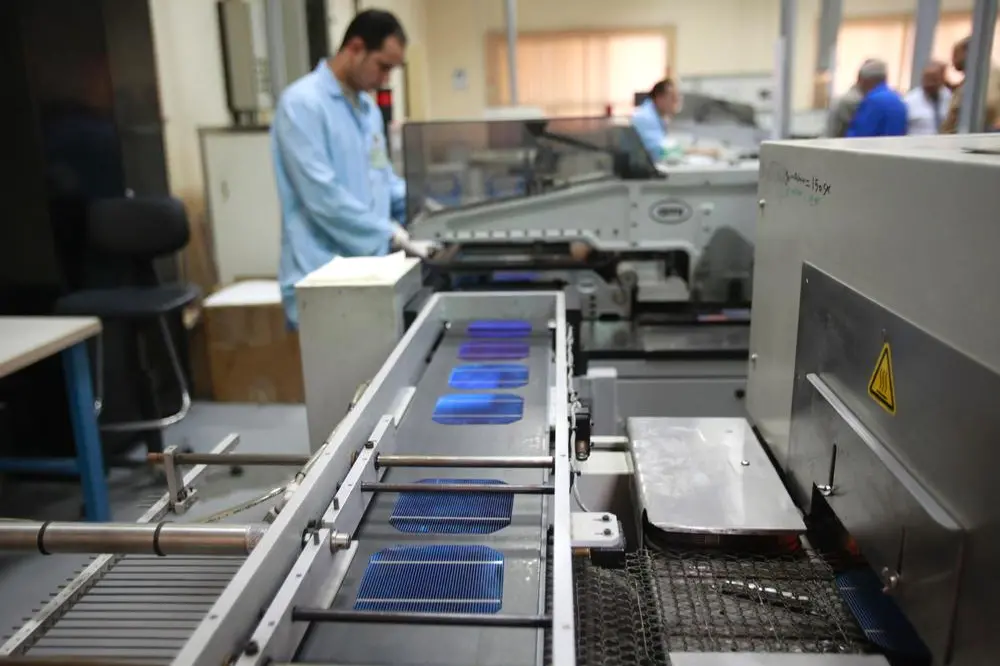PHOTO
CAIRO, Sept 6 (Reuters) - Egypt will allow international arbitration in contracts for the second round of its solar power Feed-in-Tarrif (FiT) scheme, the electricity minister said, after a standoff over the issue prompted international lenders to pull out of an earlier phase.
Egypt announced in 2014 extensive plans to develop renewable energy, originally targeting 4.3 gigawatts of wind and solar projects to be installed over three years.
Plans included a 1.8 gigawatt solar park in Upper Egypt to be developed for $3 billion and operated under a FiT scheme, which piqued investor interest due to its competitive rates.
Egypt said it would pay 13 cents per kilowatt hour (kWh) to plants with 500 kilowatts to 20 megawatts capacity and 14 cents per kWh to those with 20 to 50 MW capacity during phase one.
The FiT project was hailed as an investment bright-spot for Egypt, which has suffered a shortfall in foreign currency since the 2011 uprising which ousted Hosni Mubarak but scared off foreign investors and tourists, sources of hard currency it needs to finance imports.
But many of the planned FiT investments stalled after Egypt refused to allow for international arbitration in the contracts -- a requirement for some multinational lenders that had planned to invest billions of dollars in renewable energy in Egypt in the coming few years.
In phase two, Egypt will allow offshore arbitration, Electricity Minister Mohammed Shaker said, a decision that will likely lure back lenders such as the International Finance Corporation (IFC).
"We've agreed that the seat of arbitration be offshore, outside Egyptian borders... usually (this position) is appointed to an unbiased country that can mediate between buyers and sellers of renewable energy," Shaker told a news conference.
But Egypt will also slash the FiT rate to 7.8 cents per kWh to plants with 500 kilowatts to 20 megawatts capacity and 8.4 cents to those with 20 to 50 MW capacity, he said.
It was not immediately clear whether those rates would be enough to entice back investors who were forced to pull out of the earlier round after losing their funding and have complained about the way the dispute was handled.
Egypt had aimed to meet 20 percent of its energy needs from renewable sources by 2020, but has pushed that back to 2022.
(Reporting by Ola Noureldin and Mostafa Hashem; Editing by Lin Noueihed and Susan Thomas) ((Ola.Noureldin@thomsonreuters.com;))
Egypt announced in 2014 extensive plans to develop renewable energy, originally targeting 4.3 gigawatts of wind and solar projects to be installed over three years.
Plans included a 1.8 gigawatt solar park in Upper Egypt to be developed for $3 billion and operated under a FiT scheme, which piqued investor interest due to its competitive rates.
Egypt said it would pay 13 cents per kilowatt hour (kWh) to plants with 500 kilowatts to 20 megawatts capacity and 14 cents per kWh to those with 20 to 50 MW capacity during phase one.
The FiT project was hailed as an investment bright-spot for Egypt, which has suffered a shortfall in foreign currency since the 2011 uprising which ousted Hosni Mubarak but scared off foreign investors and tourists, sources of hard currency it needs to finance imports.
But many of the planned FiT investments stalled after Egypt refused to allow for international arbitration in the contracts -- a requirement for some multinational lenders that had planned to invest billions of dollars in renewable energy in Egypt in the coming few years.
In phase two, Egypt will allow offshore arbitration, Electricity Minister Mohammed Shaker said, a decision that will likely lure back lenders such as the International Finance Corporation (IFC).
"We've agreed that the seat of arbitration be offshore, outside Egyptian borders... usually (this position) is appointed to an unbiased country that can mediate between buyers and sellers of renewable energy," Shaker told a news conference.
But Egypt will also slash the FiT rate to 7.8 cents per kWh to plants with 500 kilowatts to 20 megawatts capacity and 8.4 cents to those with 20 to 50 MW capacity, he said.
It was not immediately clear whether those rates would be enough to entice back investors who were forced to pull out of the earlier round after losing their funding and have complained about the way the dispute was handled.
Egypt had aimed to meet 20 percent of its energy needs from renewable sources by 2020, but has pushed that back to 2022.
(Reporting by Ola Noureldin and Mostafa Hashem; Editing by Lin Noueihed and Susan Thomas) ((Ola.Noureldin@thomsonreuters.com;))





















